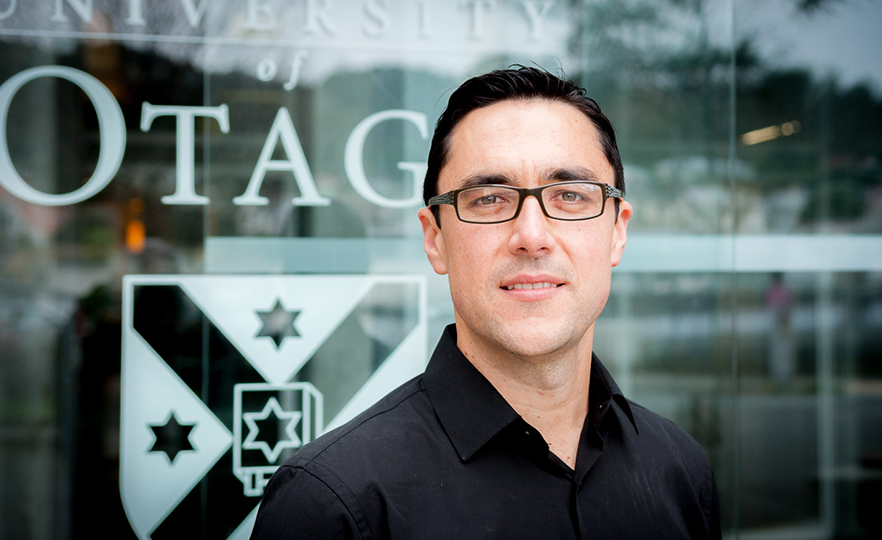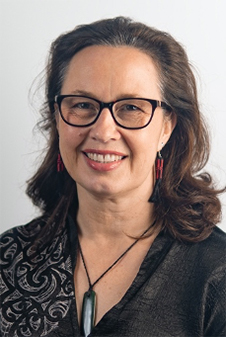
Dr Jason Gurney.
Dr Jason Gurney (Ngāpuhi) works in the Department of Public Health and is Director of the Cancer and Chronic Conditions Research Group at the University of Otago, Wellington. He is a Māori epidemiologist whose research focuses on improving cancer outcomes for Māori.
Summary of the impact
Through his relevant, quality research Dr Gurney has formed a collective, aspirational goal to eliminate inequity in cancer outcomes by 2030. This Equity by 2030 goal is included as a key objective in the national Cancer Action Plan 2019–2029. Dr Gurney's research aims to ultimately help to provide solutions to issues, not just highlight the inequities. A key to enacting these solutions is having extensive links throughout policy-making and organisational partners.
Dr Gurney's project Improving the Quantity and Quality of Life for Māori With Cancer, funded by a current Health Research Council Māori Emerging Leadership grant, has a specific focus on improving survival outcomes for Māori with cancer.
Underpinning of research
A long-standing body of evidence shows that Māori have poor survival of cancer once diagnosed. Part of Dr Gurney's work aims to describe the extent of the problem and therefore improve knowledge in this area.
A recent paper published by Dr Gurney shows that Māori have poorer cancer survival for 23 of 24 of the most commonly diagnosed cancers (Gurney, Stanley, McLeod, et al. 2020). This shows that the current system is perpetuating health disparities between Māori and non-Māori. A second piece of work has shown that Māori have less access to early diagnosis and have a poorer stage of disease at diagnosis for some cancers, but this is not true for all cancers (Gurney, Stanley, Jackson, et al. 2020). Dr Gurney has also found that the current data system does not provide enough information to be able to understand enough about survival outcomes, and that this needs improvement for change to be made.
Additional research aims to find out the reason for inequity in cancer outcomes. Ultimately, solutions will be directed toward systemic solutions for increasing access to cancer healthcare for Māori, rather than at an individual patient level.
Research snapshot
Dr Gurney presented his work at the 2019 Cancer at a Crossroads conference at Te Papa. It was here he announced his idea of a collective aspirational goal for the healthcare sector to organise thoughts and provide strategies to attack the problem of inequity in cancer outcomes and to eliminate inequity in cancer outcomes by 2030 – Equity by 2030.
Equity by 2030 has generated a lot of discussion and momentum within the cancer sector. Over the remainder of 2019, Dr Gurney worked with the Ministry of Health on the New Zealand Cancer Action Plan 2019–2029, and was able to secure Equity by 2030 as a key objective within the new plan, which was published at the end of 2019.
Details of the impact
An objective of Dr Gurney's research is to ultimately help to provide solutions to issues, not just highlighting the inequities. This includes planning for solutions by improving access to early diagnosis, access to treatment and access to screening.
Key to enacting these solutions is having extensive links throughout policy-making and organisational partners. Dr Gurney is seconded to the national cancer control agency Te Aho o Te Kahu Cancer Control Agency one day per week, and he is a Board Member of Hei Āhuru Mōwai (national Māori cancer leadership group), which advocates for Māori cancer patients in New Zealand. Dr Gurney also has a strong relationship with Professor Di Safarti (formerly University of Otago), who is now the Chief Executive of Te Aho o Te Kahu Cancer Control Agency.

Michelle Mako.
Michelle Mako, Director of Equity at Te Aho o Te Kahu Cancer Control Agency says Dr Gurney's work, as part of the work coming from the Cancer and Chronic Conditions Research Group (C3) at the University of Otago, is a great asset to supporting the agency's work. Published articles by the C3 group enable her team to incorporate this knowledge into their work, for example in informing the State of Cancer Report released in February 2021 (Te Aho o Te Kahu Cancer Control Agency, 2021).
“This research has made a significant contribution to cancer knowledge and will continue to be of value for some time to come”, Michelle Mako says.
As Dr Gurney works part-time at Te Aho o Te Kahu, the organisation is able to use his expertise to gain an understanding of the wider body of literature. He provides a valuable Māori and equity perspective to Te Aho o Te Kahu. Additionally, his work with He Āhuru Mōwai has helped to influence the work of Te Aho o Te Kahu. Michelle Mako describes He Āhuru Mōwai as “the transformational backbone of Māori leadership for cancer”.
Key points
- Relevant, quality research has enabled translation of the findings into the Cancer Action Plan 2019–2029.
- The research is done to ultimately help to provide solutions to issues, not just highlighting the inequities.
- By working at Te Aho o Te Kahu and He Āhuru Mōwai and having close relationships with colleagues, Dr Gurney is able to have uptake of his findings by these groups.
Further information
He Pūrongo Mate Pukupuku o Aotearoa 2020, The State of Cancer in New Zealand 2020
References
- Gurney J, Stanley J, McLeod M, Koea J, Jackson C, Sarfati D. Disparities in Cancer-Specific Survival Between Māori and Non-Māori New Zealanders, 2007-2016. JCO Global Oncology. 2020 Jun 8;(6):766–74.
- Gurney J, Stanley J, Jackson C, Sarfati D. Stage at diagnosis for Māori cancer patients: disparities, similarities and data limitations. NZMJ. 2020;133(1505).
- Te Aho o Te Kahu Cancer Control Agency. He Pūrongo Mate Pukupuku o Aotearoa 2020. The state of cancer in New Zealand 2020. [Internet]. Te Aho o Te Kahu Cancer Control Agency; 2021.
